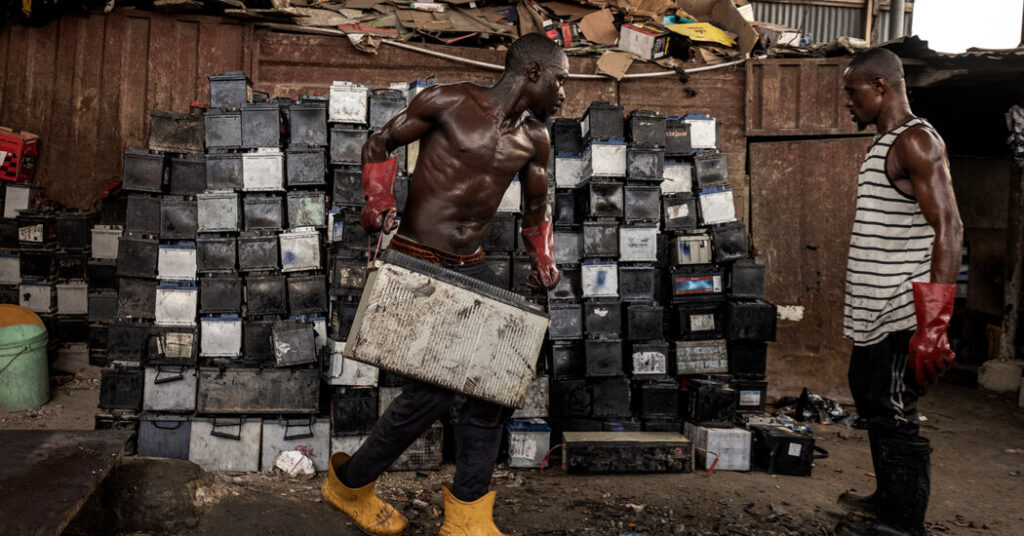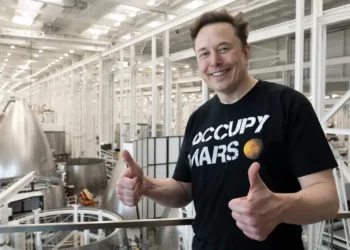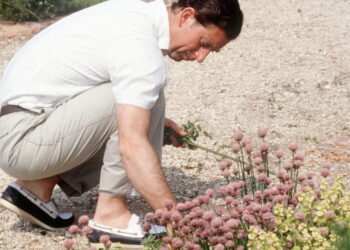A lot of companies market themselves as clean and green to people who care about the environment. But global supply chains have grown so complex that it’s difficult to know if a product is actually environmentally friendly, or if it carries a horrible human cost.
My colleague Peter Goodman has investigated corporations for the past quarter century. He recently spent time in Nigeria reporting on factories that recycle the batteries that go into millions of American and European cars. He came back with unrelenting headaches and elevated lead levels in his blood — a small indication of what the people who live near these factories endure every day. Read his report for us below.
A town covered in lead
Lead dust is everywhere in Ogijo, a town north of Lagos — on kitchen floors, vegetable gardens, church grounds and schoolyards.
With every breath, local people absorb lead particles into their bloodstreams. The metal seeps into their brains, wreaking havoc on nervous systems. Toddlers ingest it by crawling across floors and then putting their hands in their mouths, in some cases leading to irreversible brain damage.
This public health catastrophe is the result of local factories that recycle car batteries, extracting the lead within to make new products. They do this in Nigeria thanks to a well-established, if unsavory, reality of the global economy: As tighter standards have limited lead pollution in wealthier nations, manufacturers have shifted their sights abroad. They rely increasingly on communities so desperate for jobs that their leaders have tacitly accepted lead poisoning as the cost of livelihood.
You can click here to read the details of our investigation, conducted in partnership with The Examination, a nonprofit newsroom that investigates global health. We commissioned blood tests for 70 Ogijo residents, which found harmful levels of lead in 7 out of 10 people. And we traced the lead recycled in Nigeria to a major battery manufacturer in the U.S. whose products are found under the hoods of millions of cars.
What is happening in Nigeria is both shocking and familiar. Shocking because of the scale of the harm involved; familiar because similar dynamics are at work across thousands of other products.
As supply chains extend across oceans, the links have become so complex that retailers are sometimes unsure about the origins of their parts and raw materials. Even the best-intentioned companies struggle to figure out what they are buying, from whom and with what social and environmental consequences.
Same story, different industries
Over the last quarter-century, I have written multiple versions of this basic story.
While looking into illegal logging in Asia, I discovered that a major international retailer was unaware — or could at least plausibly deny — that it was using logs illegally cut in the Russian Far East.
I learned that a prominent American fashion brand either did not know — or preferred not to discuss — the brutal tactics used to crush a labor movement at a factory making its products in Guatemala.
And I found an enormous American retailer that employed a multinational auditing company to scrutinize factories all over the world, including in Vietnam, Turkey and Mexico, for child labor, yet paid almost no attention to the next link in the chain — the suppliers of its suppliers.
Battery recycling is an especially toxic industry to explore.
North American and European battery manufacturers have pioneered elaborate systems of recycling and marketed themselves as stewards of the environment. The auto industry cites its reuse of lead as a prime example of the circular economy.
Yet, in using imported lead, manufacturers rely on middlemen to provide assurances that the metal has been safely produced. These middlemen conduct inspections in which they flag problems and recommend the addition of pollution-limiting equipment, but they leave it to the factories to decide whether to follow through.
In essence, the industry has engineered a system in which everyone can plausibly blame someone else when trouble comes to light.
Our investigation revealed that some of the lead recycled in Nigeria was being purchased by East Penn Manufacturing, the second-largest automotive battery manufacturer in the U.S. When we confronted the company, the executive chairman told us that, until our inquiry, it had relied on its brokers’ assurances that everything was fine.
“Could that be me being too trusting?” he said. “I’ll take that shot.”
The incentives to do things cheaply
We also spent time with a company in Nigeria called Green Recycling that took on the extra costs of doing it right, borrowing millions of dollars to install equipment that limits lead pollution.
But Green could not compete with other companies. It could not charge enough to cover its borrowing costs. It could not pay enough for spent batteries and was constantly outbid. And Green is now out of business.
And here is perhaps the most unsettling part of these supply chains. Because most of their parts are invisible to consumers — and even to other companies involved in production — the incentive to do things right is frequently trumped by a more powerful force: the rewards of doing things cheaply. Even when that comes at the cost of permanent lead poisoning in poor communities in West Africa.
MORE TOP NEWS
U.S. lawmakers voted to release the Epstein files
The House of Representatives overwhelmingly approved a bill directing the Justice Department to make public all files related to its investigation into the convicted sex offender Jeffrey Epstein.
Some Republicans had worked for months to block a vote, wary of angering President Trump, who had dismissed the documents as part of a “hoax.” But Trump later reversed himself and encouraged lawmakers to back the bill. As my colleague Luke Broadwater explains, Trump has the power to release the files without Congress. So why doesn’t he?
Trump defended MBS over a journalist’s murder
Trump praised Crown Prince Mohammed bin Salman of Saudi Arabia at the White House yesterday and brushed aside a reporter’s question about the death and dismemberment of Jamal Khashoggi, a Washington Post journalist, in 2018. “Things happen,” Trump said.
The visit was a striking diplomatic turnabout for the crown prince, who had not been on U.S. soil since Khashoggi was killed at the Saudi embassy in Istanbul. Trump said on Monday that he intended to sell F-35 fighters to the kingdom despite concerns about the risks involved with selling the planes’ technology to an ally that has a security partnership with China.
OTHER NEWS
-
President Volodymyr Zelensky of Ukraine says he will try to kick-start peace talks with Russia on a visit to Turkey today.
-
Google released its new A.I. model, Gemini 3, ramping up the competition with OpenAI and Anthropic.
-
Larry Summers, a former Treasury secretary and Harvard president, said he would step back from public commitments because of his newly revealed ties to Jeffrey Epstein.
-
The U.N. Security Council voted to endorse Trump’s plan for Gaza, but the road ahead is still rough. We went inside the U.S. base in Israel that is helping plan the territory’s future.
-
Hundreds of Gazans arrived in South Africa on mystery flights that caught the country’s government by surprise.
-
The Metropolitan Museum of Art returned a 227-year-old Buddhist painting that the U.S. Army was believed to have taken during the Korean War.
SPORTS
Formula 1: Inside the plan to help the Las Vegas Grand Prix bounce back after a down year.
Tennis: Can padel really become a genuine rival?
HEADLINE OF THE DAY
Wife of Astronaut Pleads Guilty to Falsely Alleging Crime in Space
— A woman pleaded guilty last week to lying to law enforcement when she falsely accused her estranged wife, who is an astronaut, of illegally gaining access to her bank account from the International Space Station.
MORNING READ
For many Italian households, pasta is a staple. But in Gragnano, near Naples, it’s something more: a craft that has defined the town for centuries. That’s where Garofalo, one of Italy’s largest pasta exporters, is based.
American kitchens are an important market for Garofalo, but that could end next year. The company and a dozen other Italian producers are facing tariffs of more than 100 percent on their exports to the U.S. Read more.
AROUND THE WORLD
What they’re selling … in the art world
It’s a big week for the art market. After a rough patch that saw a decline in sales, art sellers insist that things are turning around. Some upcoming marquee auctions this week will test the market’s appetite.
A surrealist painting by Frida Kahlo could go for $60 million on Thursday, which would be a public auction record for a work by a female artist. With an estimate of about $150 million, Gustav Klimt’s lush portrait of Elisabeth Lederer, the daughter of his most important patron, is expected to be the priciest work this season.
Bidding for a gold toilet by Maurizio Cattelan (the sculptor whose duct-taped banana was a sensation last year) starts at $10 million. The auction houses are predicting the week’s sales could generate $2.2 billion. Take a look at the six major artworks up for auction.
RECOMMENDATIONS
Read: The science fiction writer Chloe Gong recommends these cyberpunk novels with plenty of techno thrills.
Watch: Oliver Laxe’s “Sirat” is perhaps the year’s least describable and most terrifying film.
Wear: Is the suit making a comeback? Our critic has advice on suiting up.
RECIPE
If you have traveled in the Greek Islands, chances are you have had this fish baked with tomatoes and onions. The robust flavors in the tomato sauce work well with a variety of white fishes.
WHERE IS THIS?
Can you guess where this pastoral landscape is?
TIME TO PLAY
Here are today’s Spelling Bee, Mini Crossword, Wordle and Sudoku. Find all our games here.
You’re done for today. See you tomorrow! — Katrin
We welcome your feedback. Send us your suggestions at [email protected].
Katrin Bennhold is the host of The World, the flagship global newsletter of The New York Times.
The post Investigating a Recycling Disaster appeared first on New York Times.




